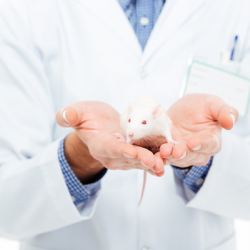
Menopause often has some pretty negative effects on women. Their risks of heart disease, osteoporosis and obesity all increase, to say nothing of the hot flashes that can make life a misery. And while we do have drugs that can prevent or treat osteoporosis effectively, the same is far from true about obesity. A recent report in Nature provides preliminary evidence that a means of dealing with both obesity and bone loss might just be in the pipeline — an antibody that blocks receptors for the hormone FSH (follicle-stimulating hormone). The research was carried out by Dr. Peng Liu from the Mount Sinai Medical School in New York City and colleagues from a number of institutions.
When a woman experiences menopause, the ovaries stop producing the hormone estrogen. This cessation affects many target tissues in the body — importantly this includes the pituitary gland which produces the FSH. So when estrogen production drops during menopause, the pituitary responds by upping its production of FSH to get the blood levels of estrogen produced by the ovaries back to premenopausal levels (but of course that doesn’t work.) While mice don’t undergo menopause the way that women do, one can mimic the menopausal milieu by removing the rodents’ ovaries — no ovaries, no estrogen, higher levels of FSH.
The investigators produced antibodies to the mice’s FSH receptors, which would prevent the hormone from binding to those receptors and thus block whatever effects it would have in various tissues. They compared the effects of the anti FSH receptor (FSHr) antibody in normal and ovariectomized mice with those of mice treated with a different antibody (goat IgG) which would be inactive in mice.
Whether treated with FSHr or the IgG, the mice had similar levels of circulating FSH, indicating that the FSHr didn’t act by causing a decrease in the hormone levels.
The following were the important results of blocking the FSHr in ovariectomized mice:
- FSHr antibody-treated mice reduced high-fat diet-induced obesity: body weights were the same, but the antibody-treated mice had less body fat.
- Mice treated with antibody, when fed with normal chow, showed a reduction in body weight — their fat mass was reduced and lean body mass increased.
- Antibody-treated mice showed an increased energy expenditure which was not due to increased activity, but rather an increase in the conversion of white to brown fat. And brown fat in rodents can account for large increases in energy utilization.
The authors also cited similar work (1) that found blocking the FSHr resulted in less bone loss via stimulating bone formation and blocking bone resorption.
While a mouse is not a woman, these results imply that blocking the FSH receptor in peri- and menopausal women might be effective in blocking the accretion of visceral fat that so often accompanies menopause, as well as protecting bone.
Much work remains to be done before such an antibody can be used in humans. For example, any possible adverse effects would have to be evaluated in human trials, effective dosages would have to be determined, and a means of delivering the antibody to circumvent the necessity for injection would have to be developed (since antibodies are proteins, they would break down if given by mouth). However, if this means of influencing menopausal effects continues to bear fruit, perhaps by the time millennials reach menopausal age there will be an effective means of preventing the negative effects that plague many women today.
1)Zhu, L.L. et al. Blocking antibody to the B -subunit of FSH prevents bone loss by inhibiting bone resproptime and stimulating bone synthesis. Proc. Natl Acad Sci. USA 109, 14574-14579 (2012).
Zhu, L.D. et al. Blocking FSH action attenuates ostoeclastogenesis. Biochem. Biophys. Res. Commun. 422, 54-58 (2012).
